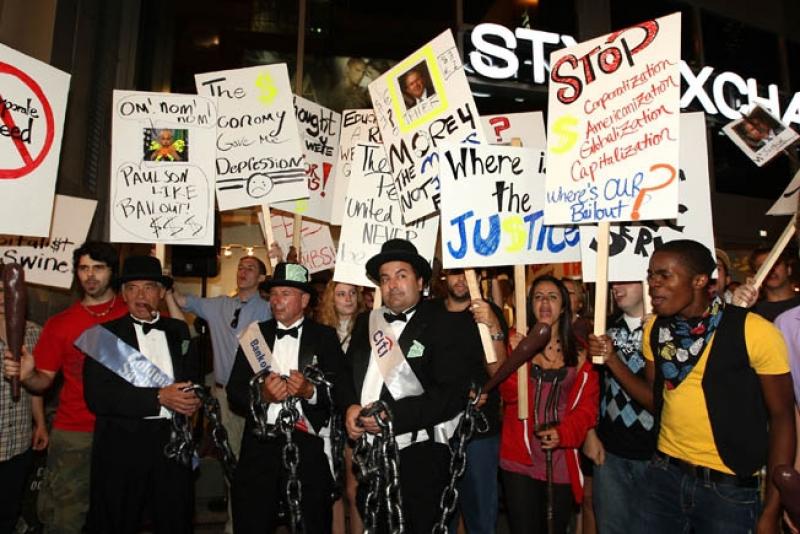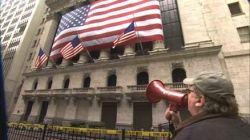Capitalism: A Love Story | reviews, news & interviews
Capitalism: A Love Story
Capitalism: A Love Story
Michael Moore's take on the decline of the American empire

If Michael Moore's new film were a person, it would be diagnosed with a severe case of Attention Deficit Disorder.
Any one of these topics would, for most directors, provide more than enough fuel for a film in its own right (well, possibly not the cats). But here's the thing about Moore: you can say what you like about his movies, but he is a grandmaster at working a room and his work has the popular touch. After a screening of Capitalism: A Love Story at the Sheffield Doc/Fest last November, he Skyped the cinema to take audience questions, and had everyone eating out of his hand in a heatbeat.
His film displays all the familiar maddening qualities: the shameless tear-jerking, the superabundance of righteous indignation, the glib jokes, the brash self-promotion, the fragmented content, the fuzzy analysis - although Moore half-heartedly tries to explain them, I came out still not knowing what derivatives are. One section looks at "dead peasant insurance", a breathtakingly cynical scheme whereby businesses take out secret life insurance policies on their staff. But, instead of telling you what you want to know, which is how this is feasible and even legal, he lingers on emotional close-ups of bereft relatives (you can find out more about it, though, at www.deadpeasants.biz).
 There are the obligatory sequences of Moore doorstepping the bad guys. "It's Michael Moore to see the Chairman," he announces to the security man at General Motors, pretty much as he did in his first, 1989 film Roger and Me. At the end, armed with a bullhorn, he plasters yellow "crime scene" police tape around the New York Stock Exchange and invites the occupants to come out for a citizen's arrest. (The cops, Moore revealed afterwards in the Q&A, though he doesn't show it in the film, didn't bother to arrest him but instead told him to take his time. Their pension fund had been emptied by the nightmare on Wall Street.) You could - and I did - view these escapades as cheap, overused stunts, but they got a tremendous response from the audience.
There are the obligatory sequences of Moore doorstepping the bad guys. "It's Michael Moore to see the Chairman," he announces to the security man at General Motors, pretty much as he did in his first, 1989 film Roger and Me. At the end, armed with a bullhorn, he plasters yellow "crime scene" police tape around the New York Stock Exchange and invites the occupants to come out for a citizen's arrest. (The cops, Moore revealed afterwards in the Q&A, though he doesn't show it in the film, didn't bother to arrest him but instead told him to take his time. Their pension fund had been emptied by the nightmare on Wall Street.) You could - and I did - view these escapades as cheap, overused stunts, but they got a tremendous response from the audience.
Moore's crack research team has a flair for nosing out amazing scoops. Fahrenheit 9/11 uncovered a tragi-comic clip of President Bush reading a story about a goat in a primary school classroom at the moment when the World Trade Center was struck. Capitalism concludes with a scratched archive clip of Franklin D Roosevelt shortly before his death outlining his plans for a Second Bill of Rights which would assure such staples as housing, food and healthcare for all Americans (they're still waiting). Never before screened publicly, it's the simplest, most moving sequence in all the film. The closing credits quietly punch the point home by interspersing similar quotes from America's Founding Fathers - Disraeli, Jefferson, Adams. These were long-cherished ideals that, in a matter of decades, were flushed down the pan by the country's fat cats.
Capitalism: A Love Story (which was shot in the midst of the 2008 Presidential campaign) doesn't make much effort to speculate what might happen under the new administration. We see yet more over-excited scenes of people learning the election results, and Moore notes in passing that Obama received funds from big business. Quizzed about this in Sheffield, the director, with the benefit of a little more hindsight, said that he didn't believe in the tooth fairy, and that there was no quick fix for the "tremendous and perhaps permanent damage done by Bush and Cheney". But, he added, "Maybe Obama will be a Roosevelt of the 21st century and we will catch up with the civilised world." And, for all the demagogy of his film, when Moore, looking rather tired and rumpled, spoke with undoubted passion about these things, it was difficult to doubt his sincerity.
Share this article
The future of Arts Journalism
You can stop theartsdesk.com closing!
We urgently need financing to survive. Our fundraising drive has thus far raised £49,000 but we need to reach £100,000 or we will be forced to close. Please contribute here: https://gofund.me/c3f6033d
And if you can forward this information to anyone who might assist, we’d be grateful.

Subscribe to theartsdesk.com
Thank you for continuing to read our work on theartsdesk.com. For unlimited access to every article in its entirety, including our archive of more than 15,000 pieces, we're asking for £5 per month or £40 per year. We feel it's a very good deal, and hope you do too.
To take a subscription now simply click here.
And if you're looking for that extra gift for a friend or family member, why not treat them to a theartsdesk.com gift subscription?
more Film
 London Film Festival 2025 - crime, punishment, pop stars and shrinks
Daniel Craig investigates, Jodie Foster speaks French and Colin Farrell has a gambling habit
London Film Festival 2025 - crime, punishment, pop stars and shrinks
Daniel Craig investigates, Jodie Foster speaks French and Colin Farrell has a gambling habit
 I Swear review - taking stock of Tourette's
A sharp and moving tale of cuss-words and tics
I Swear review - taking stock of Tourette's
A sharp and moving tale of cuss-words and tics
 A House of Dynamite review - the final countdown
Kathryn Bigelow's cautionary tale sets the nuclear clock ticking again
A House of Dynamite review - the final countdown
Kathryn Bigelow's cautionary tale sets the nuclear clock ticking again
 theartsdesk Q&A: Idris Elba on playing a US President faced with a missile crisis in 'A House of Dynamite'
The star talks about Presidential decision-making when millions of lives are imperilled
theartsdesk Q&A: Idris Elba on playing a US President faced with a missile crisis in 'A House of Dynamite'
The star talks about Presidential decision-making when millions of lives are imperilled
 Urchin review - superb homeless drama
Frank Dillane gives a star-making turn in Harris Dickinson’s impressive directorial debut
Urchin review - superb homeless drama
Frank Dillane gives a star-making turn in Harris Dickinson’s impressive directorial debut
 Mr Blake at Your Service review - John Malkovich in unlikely role as an English butler
Weird comedy directed by novelist Gilles Legardinier
Mr Blake at Your Service review - John Malkovich in unlikely role as an English butler
Weird comedy directed by novelist Gilles Legardinier
 Don't Let's Go to the Dogs Tonight review - vivid adaptation of a memoir about a Rhodesian childhood
Embeth Davidtz delivers an impressive directing debut and an exceptional child star
Don't Let's Go to the Dogs Tonight review - vivid adaptation of a memoir about a Rhodesian childhood
Embeth Davidtz delivers an impressive directing debut and an exceptional child star
 One Battle After Another review - Paul Thomas Anderson satirises America's culture wars
Leonardo DiCaprio, Teyana Taylor, and Sean Penn star in a rollercoasting political thriller
One Battle After Another review - Paul Thomas Anderson satirises America's culture wars
Leonardo DiCaprio, Teyana Taylor, and Sean Penn star in a rollercoasting political thriller
 Steve review - educator in crisis
Cillian Murphy excels as a troubled headmaster working with delinquent boys
Steve review - educator in crisis
Cillian Murphy excels as a troubled headmaster working with delinquent boys
 Can I get a Witness? review - time to die before you get old
Ann Marie Fleming directs Sandra Oh in dystopian fantasy that fails to ignite
Can I get a Witness? review - time to die before you get old
Ann Marie Fleming directs Sandra Oh in dystopian fantasy that fails to ignite
 Happyend review - the kids are never alright
In this futuristic blackboard jungle everything is a bit too manicured
Happyend review - the kids are never alright
In this futuristic blackboard jungle everything is a bit too manicured

Add comment